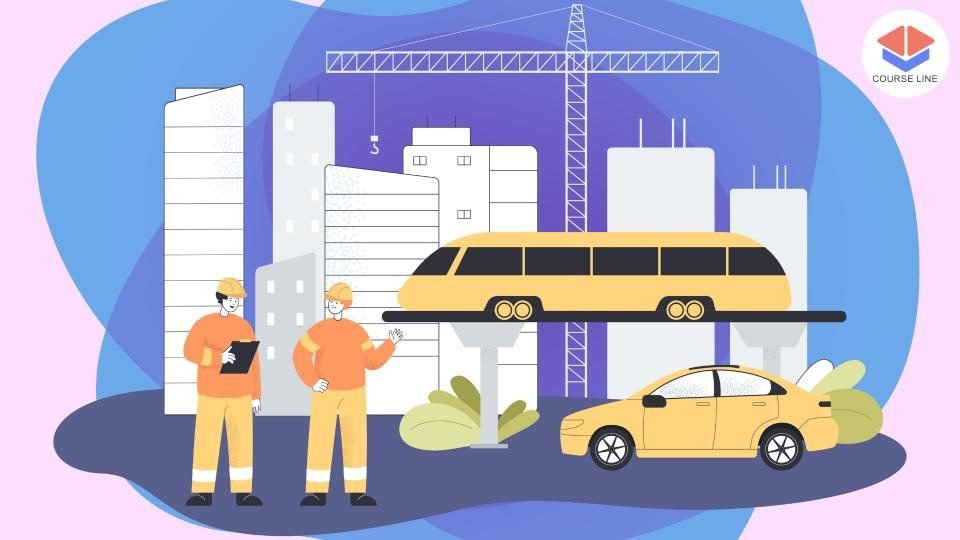Course Features
Price
Study Method
Online | Self-paced
Course Format
Reading Material - PDF, article
Duration
4 hours, 35 minutes
Qualification
No formal qualification
Certificate
At completion
Additional info
Coming soon
- Share
Overview
The Transport Engineering Level 3 Advanced Diploma is a comprehensive programme designed to provide learners with a strong foundation in the principles and practices of transportation systems. It explores the critical components of modern transport networks, including roads, railways, airports, and seaports, while addressing key concepts in planning, design, and sustainability. With the growing global demand for efficient, safe, and eco-friendly transport systems, this course prepares students to contribute meaningfully to one of the most impactful sectors in engineering.
The course begins with an introduction to the field of transport engineering, outlining its significance in economic development, urban planning, and environmental management. Learners are introduced to the various types of transport infrastructure and the roles professionals play in maintaining and innovating these systems. From here, the course delves into transportation planning, including the collection and analysis of traffic data, travel behavior studies, and demand forecasting techniques that support strategic decision-making.
A core component of the course is traffic engineering and management, where students explore traffic flow theory, control devices such as signals and signage, and methods for reducing congestion and improving road safety. Learners also engage with transportation infrastructure design, studying the technical considerations behind the construction of roadways, railways, and air and water transport hubs.
In line with global trends, the course emphasizes sustainable transport systems. Students examine the environmental impact of traditional transport, strategies for sustainable urban mobility, and the integration of innovative technologies such as electric vehicles and smart traffic systems. Additionally, the course covers transport economics and policy, providing insight into the financial, regulatory, and geopolitical frameworks that shape transport infrastructure at both national and international levels.
Real-world case studies bring theory into practice, allowing learners to evaluate real transport systems and projects across different modes, including road, rail, air, and sea. These applications help students develop analytical and problem-solving skills, reinforcing their ability to contribute to transport solutions that are efficient, inclusive, and future-ready.
Who is this course for?
The Transport Engineering Level 3 Advanced Diploma is a comprehensive programme designed to provide learners with a strong foundation in the principles and practices of transportation systems. It explores the critical components of modern transport networks, including roads, railways, airports, and seaports, while addressing key concepts in planning, design, and sustainability. With the growing global demand for efficient, safe, and eco-friendly transport systems, this course prepares students to contribute meaningfully to one of the most impactful sectors in engineering.
The course begins with an introduction to the field of transport engineering, outlining its significance in economic development, urban planning, and environmental management. Learners are introduced to the various types of transport infrastructure and the roles professionals play in maintaining and innovating these systems. From here, the course delves into transportation planning, including the collection and analysis of traffic data, travel behavior studies, and demand forecasting techniques that support strategic decision-making.
A core component of the course is traffic engineering and management, where students explore traffic flow theory, control devices such as signals and signage, and methods for reducing congestion and improving road safety. Learners also engage with transportation infrastructure design, studying the technical considerations behind the construction of roadways, railways, and air and water transport hubs.
In line with global trends, the course emphasizes sustainable transport systems. Students examine the environmental impact of traditional transport, strategies for sustainable urban mobility, and the integration of innovative technologies such as electric vehicles and smart traffic systems. Additionally, the course covers transport economics and policy, providing insight into the financial, regulatory, and geopolitical frameworks that shape transport infrastructure at both national and international levels.
Real-world case studies bring theory into practice, allowing learners to evaluate real transport systems and projects across different modes, including road, rail, air, and sea. These applications help students develop analytical and problem-solving skills, reinforcing their ability to contribute to transport solutions that are efficient, inclusive, and future-ready.
Requirements
The Transport Engineering Level 3 Advanced Diploma is a comprehensive programme designed to provide learners with a strong foundation in the principles and practices of transportation systems. It explores the critical components of modern transport networks, including roads, railways, airports, and seaports, while addressing key concepts in planning, design, and sustainability. With the growing global demand for efficient, safe, and eco-friendly transport systems, this course prepares students to contribute meaningfully to one of the most impactful sectors in engineering.
The course begins with an introduction to the field of transport engineering, outlining its significance in economic development, urban planning, and environmental management. Learners are introduced to the various types of transport infrastructure and the roles professionals play in maintaining and innovating these systems. From here, the course delves into transportation planning, including the collection and analysis of traffic data, travel behavior studies, and demand forecasting techniques that support strategic decision-making.
A core component of the course is traffic engineering and management, where students explore traffic flow theory, control devices such as signals and signage, and methods for reducing congestion and improving road safety. Learners also engage with transportation infrastructure design, studying the technical considerations behind the construction of roadways, railways, and air and water transport hubs.
In line with global trends, the course emphasizes sustainable transport systems. Students examine the environmental impact of traditional transport, strategies for sustainable urban mobility, and the integration of innovative technologies such as electric vehicles and smart traffic systems. Additionally, the course covers transport economics and policy, providing insight into the financial, regulatory, and geopolitical frameworks that shape transport infrastructure at both national and international levels.
Real-world case studies bring theory into practice, allowing learners to evaluate real transport systems and projects across different modes, including road, rail, air, and sea. These applications help students develop analytical and problem-solving skills, reinforcing their ability to contribute to transport solutions that are efficient, inclusive, and future-ready.
Career path
The Transport Engineering Level 3 Advanced Diploma is a comprehensive programme designed to provide learners with a strong foundation in the principles and practices of transportation systems. It explores the critical components of modern transport networks, including roads, railways, airports, and seaports, while addressing key concepts in planning, design, and sustainability. With the growing global demand for efficient, safe, and eco-friendly transport systems, this course prepares students to contribute meaningfully to one of the most impactful sectors in engineering.
The course begins with an introduction to the field of transport engineering, outlining its significance in economic development, urban planning, and environmental management. Learners are introduced to the various types of transport infrastructure and the roles professionals play in maintaining and innovating these systems. From here, the course delves into transportation planning, including the collection and analysis of traffic data, travel behavior studies, and demand forecasting techniques that support strategic decision-making.
A core component of the course is traffic engineering and management, where students explore traffic flow theory, control devices such as signals and signage, and methods for reducing congestion and improving road safety. Learners also engage with transportation infrastructure design, studying the technical considerations behind the construction of roadways, railways, and air and water transport hubs.
In line with global trends, the course emphasizes sustainable transport systems. Students examine the environmental impact of traditional transport, strategies for sustainable urban mobility, and the integration of innovative technologies such as electric vehicles and smart traffic systems. Additionally, the course covers transport economics and policy, providing insight into the financial, regulatory, and geopolitical frameworks that shape transport infrastructure at both national and international levels.
Real-world case studies bring theory into practice, allowing learners to evaluate real transport systems and projects across different modes, including road, rail, air, and sea. These applications help students develop analytical and problem-solving skills, reinforcing their ability to contribute to transport solutions that are efficient, inclusive, and future-ready.
-
- Overview of Transport Engineering 00:10:00
- Transport Systems and Infrastructure 00:10:00
- Career Opportunities in Transport Engineering 00:10:00
-
- Principles of Transportation Planning 00:10:00
- Data Collection and Analysis 00:10:00
- Demand Forecasting 00:10:00
- Traffic Flow Theory 00:10:00
- Traffic Control Devices 00:10:00
- Traffic Management Strategies 00:10:00
- Environmental Impact of Transportation 00:10:00
- Sustainable Urban Mobility 00:10:00
- Emerging Technologies in Sustainable Transport 00:10:00
- Case Studies in Road Transport 00:10:00
- Case Studies in Rail Transport 00:10:00
- Case Studies in Air and Water Transport 00:10:00
- Premium Certificate 00:15:00

No Reviews found for this course.
Is this certificate recognized?
Yes, our premium certificate and transcript are widely recognized and accepted by embassies worldwide, particularly by the UK embassy. This adds credibility to your qualification and enhances its value for professional and academic purposes.
I am a beginner. Is this course suitable for me?
Yes, this course is designed for learners of all levels, including beginners. The content is structured to provide step-by-step guidance, ensuring that even those with no prior experience can follow along and gain valuable knowledge.
I am a professional. Is this course suitable for me?
Yes, professionals will also benefit from this course. It covers advanced concepts, practical applications, and industry insights that can help enhance existing skills and knowledge. Whether you are looking to refine your expertise or expand your qualifications, this course provides valuable learning.
Does this course have an expiry date?
No, you have lifetime access to the course. Once enrolled, you can revisit the materials at any time as long as the course remains available. Additionally, we regularly update our content to ensure it stays relevant and up to date.
How do I claim my free certificate?
I trust you’re in good health. Your free certificate can be located in the Achievement section. The option to purchase a CPD certificate is available but entirely optional, and you may choose to skip it. Please be aware that it’s crucial to click the “Complete” button to ensure the certificate is generated, as this process is entirely automated.
Does this course have assessments and assignments?
Yes, the course includes both assessments and assignments. Your final marks will be determined by a combination of 20% from assignments and 80% from assessments. These evaluations are designed to test your understanding and ensure you have grasped the key concepts effectively.
Is this course accredited?
We are a recognized course provider with CPD, UKRLP, and AOHT membership. The logos of these accreditation bodies will be featured on your premium certificate and transcript, ensuring credibility and professional recognition.
Will I receive a certificate upon completion?
Yes, you will receive a free digital certificate automatically once you complete the course. If you would like a premium CPD-accredited certificate, either in digital or physical format, you can upgrade for a small fee.
Course Features
Price
Study Method
Online | Self-paced
Course Format
Reading Material - PDF, article
Duration
4 hours, 35 minutes
Qualification
No formal qualification
Certificate
At completion
Additional info
Coming soon
- Share
Philosophy Level 3 Advanced Diploma
Course Line244৳ 79,860.40Original price was: ৳ 79,860.40.৳ 2,443.08Current price is: ৳ 2,443.08.Charity and Fundraising Level 3 Advanced Diploma
Course Line244৳ 79,860.40Original price was: ৳ 79,860.40.৳ 2,443.08Current price is: ৳ 2,443.08.Nurse Manager Level 3 Advanced Diploma
Course Line237৳ 79,860.40Original price was: ৳ 79,860.40.৳ 2,443.08Current price is: ৳ 2,443.08.





